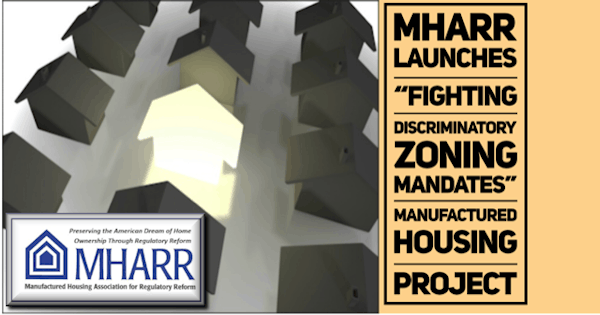
Washington, D.C., May 15, 2019 – With manufactured housing producers, retailers and communities offering their best homes (and related consumer protection) ever, and in light of the failure of the ostensible representation of the industry’s post-production sector to fully and effectively advance the marketing, consumer financing and, most importantly, the full acceptance of federally-regulated manufactured housing as the nation’s premiere source of non-subsidized affordable housing and homeownership, the Manufactured Housing Association for Regulatory Reform (MHARR) has launched a new project and initiative to fight selected, especially egregious instances of discriminatory and exclusionary zoning targeting manufactured housing and manufactured housing consumers.
This “Fighting Discriminatory Zoning Mandates” project is the first substantive step being taken by MHARR to implement a decision of the MHARR Board of Directors, at its March 2019 meeting, to take the lead in addressing three major post-production sector issues that have stifled the growth and expansion of the manufactured housing industry and its ability to serve even greater numbers of lower and moderate-income American consumers. These three issues are: (1) discriminatory zoning restrictions; (2) placement exclusions; and (3) increasing the availability of manufactured home consumer lending pursuant to the Housing and Economic Recovery Act of 2008 (HERA).
The MHARR zoning project, which is designed to take place in cooperation – and with the assistance of — manufactured housing industry state associations, asks states (see package attached) to cooperate with MHARR in providing, for review, study, analysis and follow-up, the two most egregious instances of exclusionary and/or discriminatory zoning within their respective states – with one involving the development or expansion of a manufactured housing community and the other involving the placement of an individual home on private land.
MHARR’s plans include, among other things, selecting several instances of each type of discrimination/exclusion, which will then be fully vetted and analyzed. MHARR will subsequently select one instance of each type of discrimination (i.e., community and single-home/landowner) and then begin to advance these matters to the highest necessary and appropriate court (either state or federal).
In Washington, D.C., MHARR President and CEO, Mark Weiss, stated: “Nearly twenty years after Congress adopted the enhanced federal preemption of the Manufactured Housing Improvement Act of 2000, smaller industry businesses and consumers have waited long enough for a resolution of the discriminatory zoning restrictions and exclusions that, for far too many, have slammed shut the door on the American Dream of home ownership.” Weiss continued, “Against the backdrop of a longstanding defacto leadership vacuum on this and other crucial matters, MHARR will seek to appeal to the moral compass of every industry member to join-in and support this effort, much the same as occurred in the 1990s, when MHARR’s leadership brought the industry together to modernize the original 1974 federal ‘trailer’ law and cement the status of manufactured homes as legitimate ‘housing’ through the Manufactured Housing Improvement Act of 2000.”
The Manufactured Housing Association for Regulatory Reform is a Washington, D.C.-based national trade association representing the views and interests of independent producers of federally-regulated manufactured housing.





